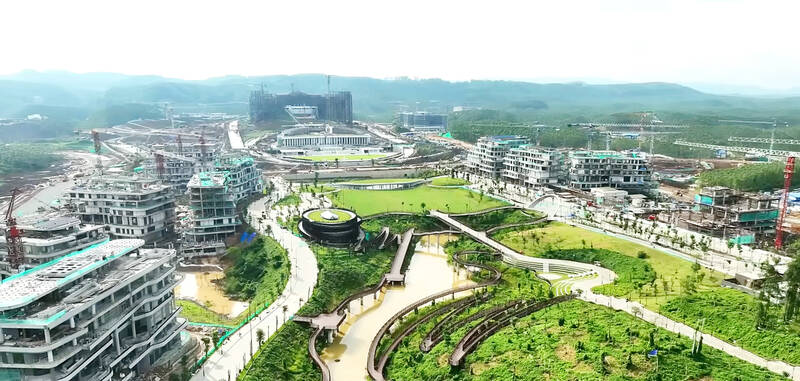Indonesia is undertaking an ambitious project to relocate its capital from Jakarta to Nusantara, a new city in the province of East Kalimantan. This bold endeavor aims to address the severe environmental challenges and urban congestion plaguing Jakarta.
The current capital city struggles with acute air pollution, frequent flooding, and rapid land subsidence. Experts predict that by 2050, a third of Jakarta could be submerged. The primary causes include excessive groundwater extraction and rising sea levels attributed to climate change. Moreover, with a population of over 10 million, it’s very much the economic center of the country. Unfortunately, this status comes with considerable traffic congestion and soaring living costs.
Nusantara’s location on the island of Borneo has been strategically chosen for its relative safety from earthquake and tsunami threats. The government envisions Nusantara as a sustainable “forest city,” with plans to preserve 70 percent of the area as green open spaces. To achieve this vision, it intends to employ eco-friendly construction methods and aim for the ultimate goal of attaining net-zero carbon emissions by 2045.

Photo: Wikimedia Commons / 照片:維基共享資源提供
However, this visionary project faces substantial challenges and opposition. Environmentalists warn that developing Nusantara could lead to extensive deforestation, threatening endangered species like orangutans. The displacement of aboriginal communities, particularly the Balik people, has also sparked controversy. Finally, critics argue that relocating the capital fails to address Jakarta’s underlying issues. They believe that resources should be directed toward improving the existing city’s infrastructure and environmental policies instead.
The success or failure of Indonesia’s capital relocation will have far-reaching implications for the nation’s future. It will also serve as a valuable lesson for other countries confronting similar dilemmas. As the project unfolds, it raises critical questions about the delicate balance between economic development, environmental conservation, and social equity—issues that resonate globally in our rapidly urbanizing world.
印尼正在進行一項雄心勃勃的計畫,將首都從雅加達遷移到東加里曼丹省的新城市努山塔拉。這一大膽的嘗試旨在解決困擾著雅加達的嚴重環境挑戰和城市擁堵問題。
目前的首都正因嚴重的空氣污染、頻繁的水患和快速的地層下陷而苦苦掙扎。專家預測,西元2050年,雅加達的三分之一可能會被淹沒。主要原因包括過度抽取地下水以及因氣候變遷導致的海平面上升。此外,擁有超過一千萬人口的雅加達無疑是國家的經濟中心。不幸的是,這種地位帶來了嚴重的交通擁堵和飆升的生活成本。
努山塔拉在婆羅洲的位置是經過策略性選擇的,因為它相對安全,不受地震和海嘯威脅。政府將努山塔拉設想為一座永續發展的「森林城市」,計劃保留70%的區域作為綠色開放空間。為了實現這一願景,政府打算採用環保的建築方法,並致力於在2045年前實現淨零碳排放的最終目標。
然而,這項富有遠見的計畫面臨著重大挑戰和反對。環保人士警告,開發努山塔拉可能導致大規模的森林砍伐,威脅到紅毛猩猩等瀕危物種。原住民社區的遷移,特別是巴利克人,也引發了爭議。最後,批評者認為,遷都並不能解決雅加達的根本問題。他們認為資源應該用於改善現有城市的基礎設施和環境政策。
印尼首都遷移的成功或失敗將對該國的未來產生深遠影響。它也將為其他面臨類似困境的國家提供寶貴的教訓。隨著計畫的展開,它提出了關於經濟發展、環境保護和社會公平之間微妙平衡的重要問題──這些議題在我們這個快速城市化的世界中具有全球性的共鳴。
MORE INFORMATION
relocate v. 搬遷;重新安置
Jakarta n. 雅加達
Nusantara n. 努山塔拉
East Kalimantan 東加里曼丹
endeavor n. 嘗試;努力
congestion n. 擁擠;阻塞
subsidence n. 下沉;下陷
Borneo n. 婆羅洲
tsunami n. 海嘯
net-zero adj. 淨零的(指溫室氣體的排放量儘可能
減少到接近零)
environmentalist n. 環保主義者
deforestation n. 砍伐森林
orangutan n. 紅毛猩猩
displacement n. 被迫移居他鄉
resonate vi. 引起共鳴
KEY VOCABULARY
1. undertake vt. 著手做;從事
Before undertaking any large project, it is essential to make a detailed plan.
在開始任何大型專案之前,制定詳細計畫是必要的。
2. province n. 省
Each province in this country has its own unique culture and traditions.
這個國家的每個省都有其獨特的文化和傳統。
3. plague vt. 不斷困擾;折磨
The question of what to do after graduation plagues many students in their final year.
畢業後該做什麼的問題困擾著許多大四學生。
4. acute adj. 十分嚴重的
The country faces an acute shortage of medical supplies in rural areas.
該國的偏遠地區面臨嚴重的醫療物資短缺。
5. extraction n. 提取;抽出
Oil extraction in this area has led to economic growth but also environmental concerns.
該地區的石油提取促進了經濟成長,但也引發了環境問題。
6. attain vt. 實現;獲得
After years of hard work, Michael finally attained his goal of becoming a doctor.
經過多年的努力,麥可終於實現了成為醫生的目標。
7. aboriginal adj. 原住民的;土生的
The government works with aboriginal communities to protect their cultural heritage.
政府與原住民社區合作,以保護他們的文化遺產。
8. infrastructure n. 基礎建設
Roads, bridges, and public transportation are all essential parts of urban infrastructure.
道路、橋樑和大眾運輸都是城市基礎建設的重要組成部分。
9. equity n. 公平;公正
The school aims to promote equity by providing equal resources to all students.
這所學校致力於透過提供所有學生平等的資源來促進公平。
學習音檔: https://magazine.english4u.net/Magdata/menu/t2oce
《空中美語》雜誌APP免費下載: https://www.english4u.net/apps/index.aspx
免費收聽當月《空中美語》雜誌課文朗讀及解析 !
文章由AMC空中美語授權使用: https://www.english4u.net

In an effort to fight phone scams, British mobile phone company O2 has introduced Daisy, an AI designed to engage phone con artists in time-wasting conversations. Daisy is portrayed as a kindly British granny, exploiting scammers’ tendency to target the elderly. Her voice, based on a real grandmother’s for authenticity, adds to her credibility in the role. “O2” has distributed several dedicated phone numbers online to direct scammers to Daisy instead of actual customers. When Daisy receives a call, she translates the scammers’ spoken words into text and then responds to them accordingly through a text-to-speech system. Remarkably, Daisy

Bilingual Story is a fictionalized account. 雙語故事部分內容純屬虛構。 Emma had reviewed 41 resumes that morning. While the ATS screened out 288 unqualified, she screened for AI slop. She could spot it a mile away. She muttered AI buzzwords like curses under her breath. “Team player.” “Results-driven.” “Stakeholder alignment.” “Leveraging core competencies.” Each resume reeked of AI modeling: a cemetery of cliches, tombstones of personality. AI wasn’t just changing hiring. It was draining the humanity from it. Then she found it: a plain PDF cover letter. No template. No design flourishes. The first line read: “I once tried to automate my

Every May 1, Hawaii comes alive with Lei Day, a festival celebrating the rich culture and spirit of the islands. Initiated in 1927 by the poet Don Blanding, Lei Day began as a tribute to the Hawaiian custom of making and wearing leis. The idea was quickly adopted and officially recognized as a holiday in 1929, and leis have since become a symbol of local pride and cultural preservation. In Hawaiian culture, leis are more than decorative garlands made from flowers, shells or feathers. For Hawaiians, giving a lei is as natural as saying “aloha.” It shows love and

1. 他走出門,左右看一下,就過了馬路。 ˇ He walked outside, looked left and right, and crossed the road. χ He walked outside and looked left and right, crossed the road. 註︰並列連接詞 and 在這句中連接三個述語。一般的結構是 x, y, and z。x and y and z 是加強語氣的結構,x and y, z 則不可以。 2. 他們知道自己的弱點以及如何趕上其他競爭者。 ˇ They saw where their weak points lay and how they could catch up with the other competitors. χ They saw where their weak points lay and how to catch up with the other competitors. 註:and 一般連接同等成分,結構相等的單詞、片語或子句。誤句中 and 的前面是子句,後面是不定詞片語,不能用 and 連接,必須把不定詞片語改為子句,and 前後的結構才相等。 3. 她坐上計程車,直接到機場。 ˇ She took a cab, which took her straight to the airport. ˇ She took a cab and it took her straight